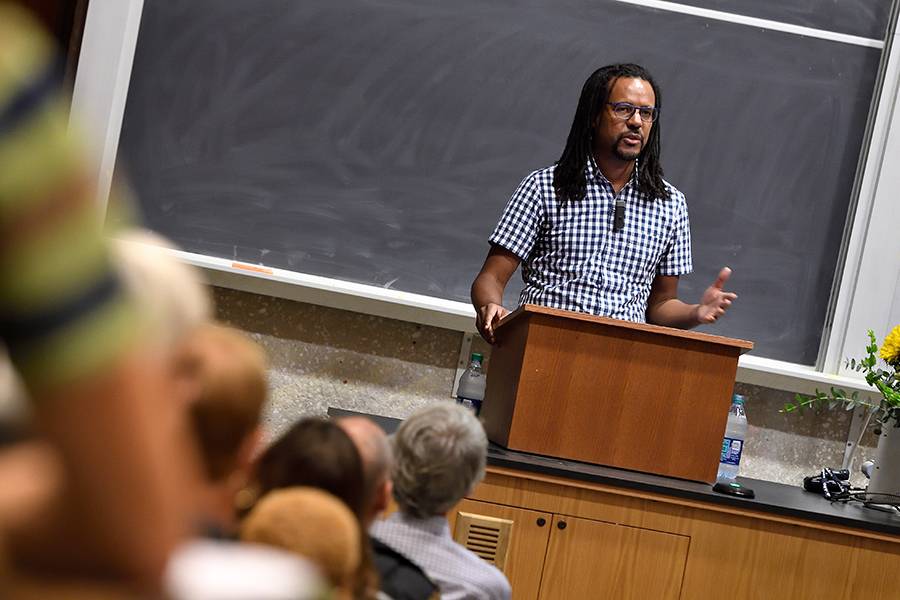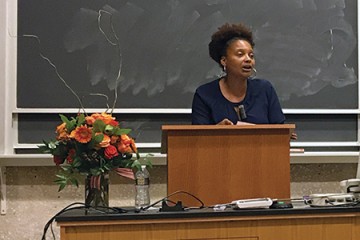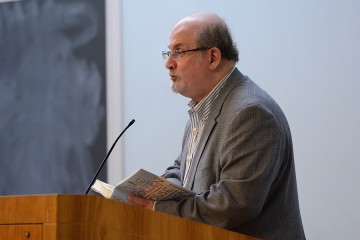Growing up as a decidedly indoor kid in Manhattan, Colson Whitehead found his first stirrings toward writing in the books of Stephen King.
"I wanted to write the black Shining or the black Salem's Lot," the acclaimed author said Tuesday in a talk at Johns Hopkins University as part of the President's Reading Series.
As he matured, Whitehead said, his love of sci-fi and horror guided him to the magic realism and absurdism of authors like Gabriel García Márquez, Jorge Luis Borges, and Samuel Beckett. That palette of influences helps explain the dose of the fantastical in Whitehead's work, which has explored zombies, dystopian futures, and—in the case of The Underground Railroad, which won him the Pulitzer Prize in 2016, among other awards—a very literal metaphor.
Also see
The novel plays with a common misconception of American history: that the "underground railroad" providing slaves a network for escape was, in fact, a literal train system. In Whitehead's book, an enslaved young woman named Cora flees north from a Georgia plantation upon the rickety subterranean railway through alternate-reality versions of Southern states.
Whitehead read passages of his New York Times best-seller and shared a dryly self-deprecating trajectory of his writing career.
He was drawn to the profession, he said, because "if you were a writer, you could work from home, [and] you didn't have to wear clothes or talk to people," he said. While studying at Harvard, Whitehead perfected the moody look—clad in all black—before he actually sat down and put pen to paper.
After landing a writing job at The Village Voice in the 1990s, Whitehead made his first attempt at a novel, what he describes now as an ill-fated concept about a "Gary Coleman-esque child star" of a '70s TV show.
"The rejection slips began to accumulate," he said. But when he considered whether to give it all up—watching Jerry Springer in his underwear in his "dirty studio apartment"—he rationalized that writing must simply be a part of his DNA.
The ancestry of writers must trace, he reasoned, from "the first Neanderthal existentialist" who questioned the purpose of hunting and gathering. "I realized I was the recipient of that 'sit on your ass, muse about crap' DNA."
Rejections eventually turned into yeses. Whitehead published his debut novel, The Intuitionist ,in 1999. Seven more books have followed, both fiction and non-fiction, including the semi-autobiographical Sag Harbor in 2009. Along the way, he picked up a MacArthur genius grant and a Guggenheim Fellowship.
Two more books are on their way, Whitehead said Wednesday: one set in 1960s Harlem and one informed by the Trump era—"another uplifting book about institutional racism," he deadpanned.
But Whitehead said he doesn't necessarily feel a "duty" as a black writer to narrow himself exclusively to issues of race.
"Sometimes race is a component, sometimes it's not," he said, pointing out: "I wrote a book about poker. That's not black poker." That 2014 book, titled The Noble Hustle: Poker, Beef Jerky & Death is Whitehead's nonfiction account of the annual World Series of Poker tournament.
From there, however, he took a hard pivot to the weighty topic of American slavery for The Underground Railroad. The novel—which won the National Book Award and the Carnegie Medal for Fiction, in addition to the Pulitzer—took 14 years from brainstorming to publishing, Whitehead said.
He said those years of mulling served as a sort of "vetting process" for confirming to himself the novel's worth: "If the idea stays with you and it's compelling, that's one argument for it."
The JHU Writing Seminars reading series continue with author visits throughout the year, including Lorrie Moore (Oct. 9), Paul Beatty (Oct. 23), and Langdon Hammer (Nov. 6).
Posted in Arts+Culture
Tagged literature, writing, reading series










